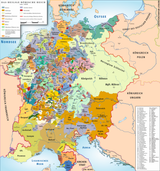>>17866873You probably mean the War of the Limburg Succession (1283–1289). This was the result of the rising power of the secular rulers (mainly Brabant, Berg,Mark and Jülich) in contrast to the waning power of the Electorate of Cologne.The bourgeois inhabitants of Cologne noticed this as well and sided with the secular rulers against the Archbishop (sidenote: already in 1074 an unsuccessful uprising against the Archbishop took place). At the Battle of Worringen in 1288 the war was decided and the side of the Archbishop of Cologne lost. Thus the power of the Electorate of Cologne diminished even more - it had to slight several castles in order to defortify the Rhine and the Archbishop de facto lost the sovereignty over the city of Cologne (de jure said city became an Imperial City in 1475) and was never able to retrieve it. He wasn't even allowed to live in the city and only was to set foot in it in order to fulfill his ecclesiastical duties as Archbishop.
>>17866916I've never played those games but historically the early monasteries/abbeys/etc. were centres of industry, commerce and education. Thus being able to amass quite a lot of wealth and so also being able to field well equipped soliders for their military ban. In addition they were usually more loyal to the Emperor in contrast to the secular rulers, as their territory was directly sourced from his imperial position.



